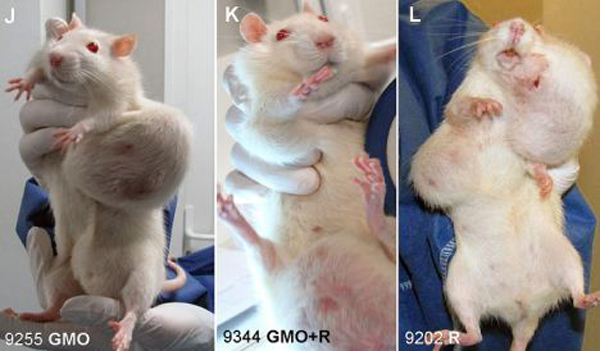This is the "dirty little secret" of the vitamin industry, but it's not one the mainstream media will touch because they refuse to admit GMOs are a problem to begin with. Those in the know, however, realize that eating any ingredients derived from GMOs may expose them to the BT insecticide chemicals found in GM corn.
GMOs are truly "hidden" in vitamins because the GM-derived ingredients are so heavily processed that all DNA is destroyed in the process, thereby destroying any footprint of genetic modification. Genetic ID tests, in other words, require particles of the food to remain relatively intact so that PCR lab equipment can replicate genetic sequences. Heavily processed ingredients such as high-fructose corn syrup, maltodextrin and ascorbic acid have no genetic material remaining, thereby sweeping their origins under the rug.
This is one reason who so many vitamins sold today are formulated with GMOs. This includes virtually ALL the popular multivitamin brands sold at grocery stores and pharmacies, by the way.
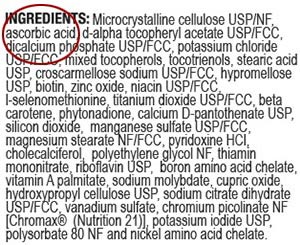
List of ingredients that are usually GMO
The Non-GMO Project Verified website lists these ingredients as commonly harboring GMOs:Amino Acids
Aspartame
Ascorbic Acid
Sodium Ascorbate
Vitamin C
Citric Acid
Sodium Citrate
Flavorings ("natural" and "artificial")
High Fructose Corn Syrup
Hydrolyzed Vegetable Protein
Lactic Acid
Maltodextrins
Molasses
Monosodium Glutamate
Sucrose
Textured Vegetable Protein (TVP)
Xanthan Gum
Vitamins
Yeast Products (such as yeast extract)
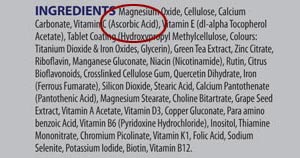
From this list, you can hopefully realize that:
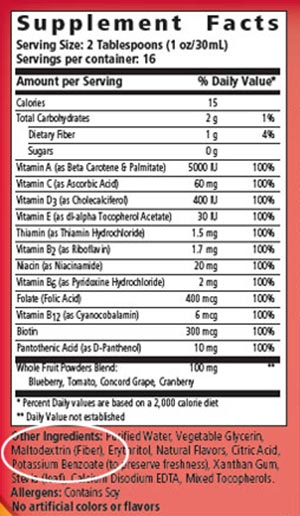 • Nearly all "vegetarian" foods are GMO (loaded with yeast extract and soy).
• Nearly all "vegetarian" foods are GMO (loaded with yeast extract and soy).• Nearly all sodas and soft drinks are GMO (HFCS, aspartame).
• Nearly all storable "emergency" food sold on the market today is GMO. (TVP, soy, MSG, yeast extract)
• Nearly all canned soups are GMO. (MSG, yeast extract)
• Nearly all children's meals and snacks are GMO. (HFCS, MSG, soy, corn)
In other words, just about everything the consuming masses are eating is contaminated with GMOs.
Here's a closer look at some of the more common GMO ingredients in vitamins and health products:
GMO ingredient #1 - Maltodextrin
Maltodextrin is a powdery, starch derivative of corn. It is used everywhere in the nutritional supplements industry, as a "filler" for fruit powders and drink mixes, as a "sweetener" for low-sugar health foods, and as a flow agent for vitamin capsules.Unless it is certified as non-GMO, all maltodextrin should be assumed to come from GMO sources. The maltodextrin manufacturing supply chain isn't even geared up to provide non-GMO maltodextrin, as the large-scale factories that produce the material run so much GM corn that there would be significant cross-contamination even if they tried to pull off a non-GMO run.
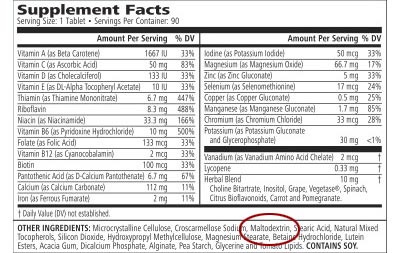
The few companies that offer non-GMO starches and sweeteners are increasingly gaining attention across the industry. I'm aware of one company called Austrade, Inc. that offers a full line of non-GMO corn-based starches and sweeteners, including non-GMO maltodextrin.
According to the company, they were the first producer to receive "Non-GMO Project Verified" approval for non-GMO maltodextrin.
Non-GMO maltodextrin is also making its way into health products such as "Ultima Replenisher," a healthy replacement for those junk sports drinks made with GMO corn syrup, salt and low-grade minerals. Ultima Replenisher is completely GMO-free, relying on a non-GMO maltodextrin from certified sources.
A small company named Allergaroo.com also makes non-GMO microwaveable foods that are designed to be free of common allergens such as casein, soy, wheat, peanuts, dairy, GMOs, etc. (Although I have to wonder about the whole microwave concept...)
GMO ingredient #2 - Ascorbic acid
In the delusional world of western thinking on nutrients, ascorbic acid is called "vitamin C."It isn't vitamin C, of course. Real vitamin C is a broad spectrum of synergistic compounds, never just an isolated, homogeneous molecule. But don't tell that to doctors, scientists or journalists, because they've all bought into the "ascorbic acid is vitamin C" delusion.
So nearly all the common "vitamin C" pills are nothing more than heavily refined ascorbic acid derived from GM corn. That's why those pills don't work, by the way. So when the mainstream media declares, "Vitamin C shows no benefit..." in clinical trials, what they are really saying is that heavily processed ascorbic acid isolated from genetically modified corn doesn't improve your health, and that's no surprise.
Look on the labels of your cheap, low-grade vitamins and multivitamins... you'll see "ascorbic acid" listed there, meaning you are eating GMOs. Throw those away. They're crap.
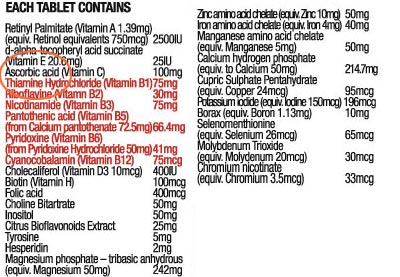
If you want real vitamin C, your best bet is to eat camu camu, which is the planet's highest source of natural, full-spectrum, food-based vitamin C. (The full synergy of nutrients, not just isolated chemicals.)
(By the way, as a side note, the FDA came to our warehouse and took a large number of samples of our camu camu to run lab tests in their Arkansas lab headquarters. They were obviously looking for heavy metals and pesticide residues. The lab tests, as we knew they would, came back 100% clear. That's because we're one of the few companies to actually test all the raw materials we import. So now we have official confirmation that even the FDA agrees that our products are clean. In truth, our own stringent lab test requirements are MORE STRICT than the FDA!)
There are also some vitamin companies making non-GMO vitamin C formulations. Expect them to be expensive because all non-GMO vitamin C must be sourced outside the United States. There is currently no U.S.-based producer of non-GMO vitamin C. (It simply doesn't exist.)
GMO ingredient #3 - Sucrose (heavily used in children's vitamins)
Take a look at almost any children's vitamins and you'll find they're made with several GMO ingredients: aspartame, sucrose and often citric acid, too.In fact, children's vitamins are by far the most toxic because they're usually formulated with a much higher concentration of toxic ingredients such as artificial sweeteners, artificial colors and GMO-derived materials.
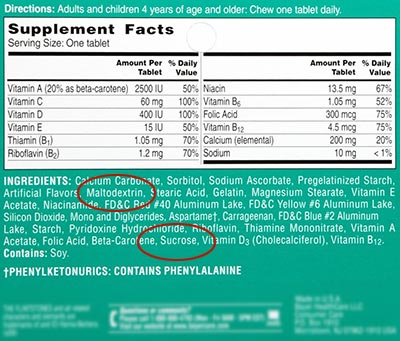
Children should be eating superfoods or food concentrates, not toxic vitamin pills. Remember, too, that the low-grade vitamin pills are manufactured by companies largely owned by the pharmaceutical industry. They have every incentive to make sure their vitamins actually cause health problems rather than prevent disease. This boosts their long-term profits as sick children become Big Pharma customers for life.
MegaFood receives the first non-GMO certification in the industry
When it comes to high quality food-based nutrients in a pill format, nobody beats MegaFood, the supplier Natural News has chosen as its supplement partner.MegaFood's manufacturing facility is the first and only facility in the United States to be certified non-GMO. Certification of all the company's products is under way, but I have personally been informed that the entire product line has been 100% non-GMO since 2007. (Actual certification takes time and will be announced when the process is complete.)
Consumers looking for truly non-GMO sources of health-supporting minerals can check out MegaFood's Balanced Minerals formulation.
Those seeking thyroid support should take a look at MegaFood's Thyroid Strength formulation.
And for non-GMO multivitamins made from real food rather than isolated chemicals, MegaFood offers a full line of daily multivitamins for men and women.

Join the call for GMO labeling on vitamins and supplements
As companies like MegaFood blaze forward in achieving non-GMO certification, they are going to force everyone else in the industry to follow suit (or lose customers). That's because consumers don't want hidden GMOs in their health supplements, obviously.People take vitamins based on the belief that vitamins won't poison them. Unfortunately, this is a false assumption given the dirty tricks played by the pharmaceutical industry in churning out harmful, synthetic vitamins loaded with toxic substances such as GMOs.
That's why I support the mandatory GMO labeling of vitamins and dietary supplements. It's also why my own brand of superfoods and dietary supplements -- Health Ranger Select -- is 100% non-GMO.
See, it's not just about labeling GMOs in foods. GMOs need to be labeled (or ultimately, banned) in everything we eat, and that includes vitamins and dietary supplements.
Most health-conscious consumers already know to avoid GMOs in foods, but they fail to avoid them when selecting vitamins and supplements. So they're taking in quantities of GMO-derived materials in their health supplements, and that defeats the whole purpose of being "health conscious" in the first place.
Until GMOs are labeled (or banned) on vitamins and supplements, you have to be vigilant in avoiding GMO-derived ingredients such as maltodextrin, sucrose, ascorbic acid, citric acid and others.
Unless the product is certified non-GMO or comes from a company that is diligently working on the certification process, there is a better than 99% chance that they contain GMOs.
And what happens when you eat GMOs? Just ask these lab rats, which were fed a combination of GM corn and glyphosate, the weed killer chemical often used on genetically modified crops:
